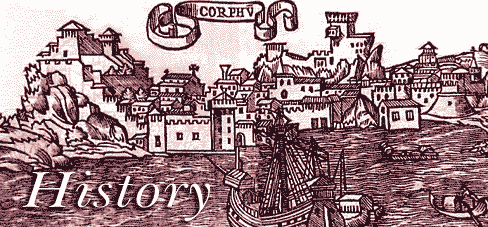 |
 |
 |
|
|
 |
- Old Fortress
- New Fortress
|
 |
|
|
|
 |
 |
|
|
|
1797-1814 THE FRENCH PRESENCE IN CORFU
When the French occupied Corfu the local people, fired by the
ideals of the French Revolution, had visions of their own independence
and of an end to the days of the nobility. The 'Libro d'Oro' was
burned and emblems of Venetian rule were destroyed, but the authoritarian
policy which the French in turn imposed soon antagonised the people
of the island.
In 1799 Russia and Turkey, concerned about French territorial
expansion, formed an alliance and took Corfu. A year later, on
March 21st 1800, Corfu and the other Ionian islands joined to
create the independent Septinsular Republic, but this was dissolved
when, in 1807, Corfu was again ceded to France under Napoleon,
a situation which lasted until 1814. By then the Ionian Academy
and the Library had been established and the local economy had
improved.
1814 - 1864 THE BRITISH ERA
In 1814 the Ionian islands were declared an independent state under the protection of Great Britain. Under British rule, the economy recovered fully, a road network was constructed, the Ionian Academy (1824) was established as the first Greek university, and, most important of all, Greek became the official language. The British remained in Corfu until 1864, when the islands were united with the rest of Greece.
1864-TODAY
On May 21st 1864, Corfu and the other Ionian islands finally
regained their Greek identity, and the long years of foreign occupation
came to an end. But this also signalled the end of Corfu's brilliance
as the capital of the Ionian State. The small, newly-established
Greek state could not afford the existence of two separate poles
of culture and wealth , and the University and other cultural
institutions had to be sacrificed. By 1900, Corfu was just another
provincial town with memories of a glorious past. In 1923 it was
bombarded and temporarily occupied by the Italians, after the
Italian General Cellini was murdered on Greek territory. During
the Second World War, in 1940, it was bombed and once again occupied
by the Italians and in 1943 suffered a huge catastrophe when bombed
by the Germans, and the Ionian Academy, the Library, and the Municipal
Theatre were burnt down.
In the hard years that followed the end of the war, Corfu shared
the fortune of the rest of Greece. Poverty, political crisis and
emigration continued until the late 1960's, when tourist development
gave a new impetus to the economic and social life of Greece.
The island's attraction for tourists was already evident by the
turn of the century. As well as being the spot chosen by the tragic
Empress Sissi for her Achillion Palace, built in 1890 as a refuge
from the intrigues of the Hapsburg court, it also became the setting
of the Bella Venezia Hotel, a beautiful hostelry which was often
compared with the Grande Bretagne in Athens and attracted the
aristocracy of Europe as guests. From the early years of the century
up until the Second World War, Corfu rivalled Capri and Majorca
as the favourite Mediterranean destination of the European elite.
During the last 40 years , the growth of mass tourism, combined
with the island's natural beauty and historic past, has made Corfu
one of the most popular holiday destinations for countless people
from all over the world, who never cease to recall the wonderful
summer days they spent in Corfu.
Visiting the fortresses, the old mansions, the monasteries, passing
the time at cafes and village tavernas, the visitor can take pleasure
in experiencing a living culture, one which is evident in the
character of the charming Corfiots..
|
|
 |




![]()